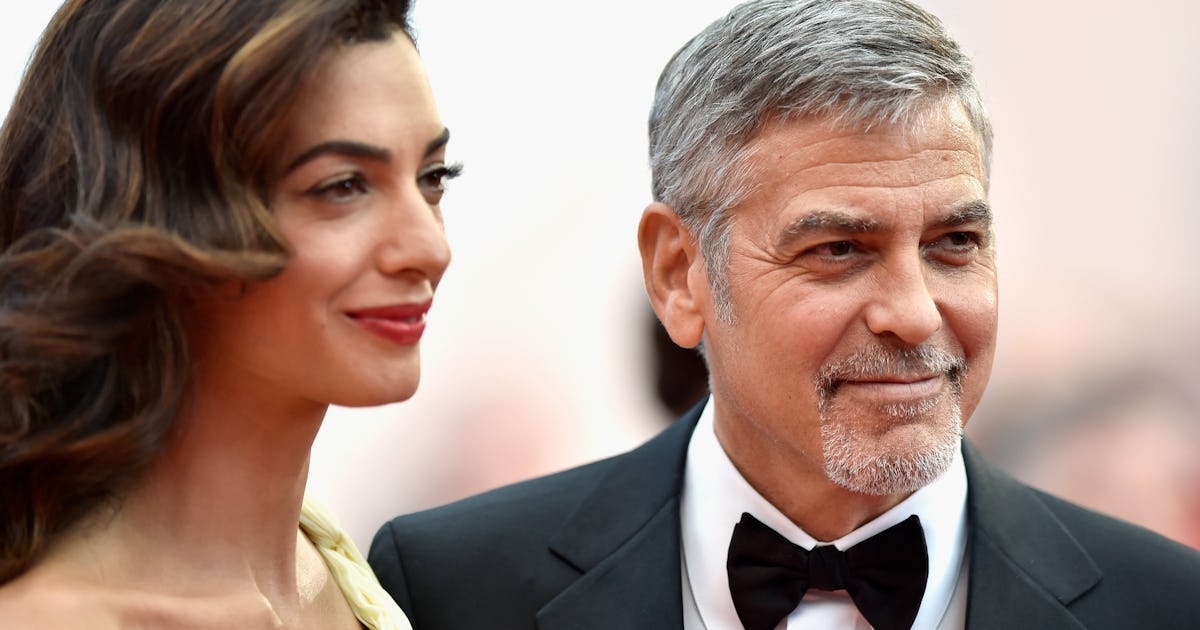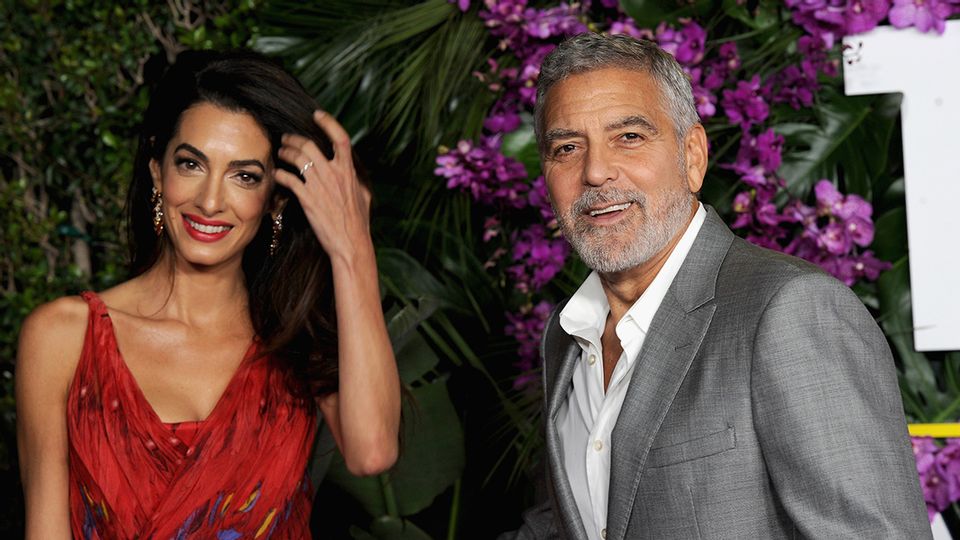Amal Clooney, one of the most admired human rights lawyers and public figures, has been under constant media scrutiny, especially regarding her personal life. As a global icon, her parenting journey has sparked numerous questions, including whether she used a surrogate to welcome her twins. In this article, we will delve into the facts and separate myth from reality, providing you with accurate information about Amal and George Clooney's family journey.
Amal Clooney's life has been nothing short of inspiring. From her high-profile legal cases to her marriage with Hollywood legend George Clooney, every aspect of her life has fascinated the world. One of the most intriguing topics revolves around the birth of her twins, Alexander and Ella. The question "Did Amal Clooney use a surrogate?" has been widely debated in the media, leading to confusion and misinformation.
This article aims to address this question comprehensively while exploring Amal's incredible journey as a mother, lawyer, and humanitarian. We will also provide valuable insights into surrogacy, its relevance, and its prevalence in modern parenting.
Read also:Kim K On Beach The Ultimate Guide To Her Iconic Moments And Style
Table of Contents
- Biography of Amal Clooney
- Amal Clooney's Family Life
- What Is Surrogacy?
- The Birth of Alexander and Ella
- Did Amal Clooney Use a Surrogate?
- Celebrity Surrogacy Trends
- Ethical Considerations in Surrogacy
- Health Aspects of Surrogacy
- Legal Issues Surrounding Surrogacy
- Conclusion
Biography of Amal Clooney
Early Life and Career
Amal Clooney, born Amal Alamuddin on March 3, 1978, in Beirut, Lebanon, is a renowned human rights lawyer and activist. She grew up in the United Kingdom, where she pursued her education and eventually earned a law degree from New York University. Amal's career took off when she joined Doughty Street Chambers, a prestigious law firm in London, where she specialized in international law and human rights cases.
Her work on high-profile cases such as Julian Assange's extradition battle and the Yazidi genocide case solidified her reputation as a formidable legal mind. Amal's dedication to justice and equality has earned her widespread acclaim and respect globally.
Personal Life
In 2014, Amal married actor George Clooney in a lavish ceremony in Venice, Italy. The couple's union was celebrated worldwide, bringing together two influential figures from different fields. Their marriage marked the beginning of a beautiful journey that would soon lead to parenthood.
Amal Clooney's Biodata:
| Full Name | Amal Ramzi Alamuddin Clooney |
|---|---|
| Birthdate | March 3, 1978 |
| Place of Birth | Beirut, Lebanon |
| Profession | Human Rights Lawyer |
| Spouse | George Clooney |
| Children | Alexander and Ella Clooney |
Amal Clooney's Family Life
Amal Clooney and George Clooney's family life has been a subject of fascination for fans worldwide. In June 2017, the couple welcomed twins, Alexander and Ella, into their lives. The announcement was met with joy and excitement, as the world watched the couple embrace parenthood.
Despite their busy schedules, Amal and George have prioritized their family, ensuring they spend quality time with their children. Their commitment to raising Alexander and Ella in a loving environment has been evident through their public appearances and interviews.
Read also:Chinese New Year 1967 A Journey Through History Traditions And Cultural Significance
What Is Surrogacy?
Surrogacy is a reproductive arrangement where a woman carries and delivers a child for another person or couple. This practice has gained popularity over the years, especially among celebrities and couples facing fertility challenges.
Types of Surrogacy:
- Gestational Surrogacy: The surrogate is not genetically related to the child.
- Traditional Surrogacy: The surrogate uses her own egg and is genetically related to the child.
Surrogacy offers a viable option for individuals or couples who cannot conceive naturally or carry a pregnancy themselves. It is regulated differently across countries, making it essential to understand the legal implications.
The Birth of Alexander and Ella
A Momentous Occasion
The arrival of Alexander and Ella Clooney in June 2017 was a momentous occasion for Amal and George. The twins were born via C-section in a London hospital, sparking speculation about the possibility of surrogacy. However, official statements from the couple confirmed that Amal carried and delivered the twins herself.
George Clooney shared details about the twins' birth during interviews, emphasizing the couple's joy and gratitude. Their decision to keep the birth details private highlights their preference for maintaining a sense of normalcy despite their public personas.
Did Amal Clooney Use a Surrogate?
Speculation about Amal Clooney using a surrogate arose due to her demanding career and the twins' birth. However, there is no credible evidence to support this claim. Amal has consistently been open about her role as a mother, dispelling rumors and misinformation.
Medical experts have noted that Amal's pregnancy and delivery were successful, reinforcing the fact that she carried the twins herself. The couple's transparency in sharing updates about their children further validates their story.
Celebrity Surrogacy Trends
Celebrities like Kim Kardashian, Sarah Jessica Parker, and Elton John have opted for surrogacy to expand their families. This trend reflects the increasing acceptance of alternative family-building methods in modern society.
Advantages of Surrogacy:
- Provides a solution for couples facing fertility challenges.
- Allows intended parents to have biological children.
- Offers a supportive network for intended parents and surrogates.
While surrogacy offers numerous benefits, it also comes with its own set of challenges, including legal and ethical considerations.
Ethical Considerations in Surrogacy
Surrogacy raises important ethical questions about the rights and well-being of all parties involved. Critics argue that commercial surrogacy can exploit vulnerable women, while supporters emphasize the importance of choice and autonomy.
International organizations and governments are working to establish clear guidelines and regulations to ensure ethical practices in surrogacy. These efforts aim to protect the rights of surrogates, intended parents, and children.
Health Aspects of Surrogacy
The health of both the surrogate and the intended child is a critical consideration in surrogacy arrangements. Surrogates undergo rigorous medical evaluations to ensure they are physically and mentally prepared for the process.
Key Health Factors:
- Prenatal care for surrogates.
- Genetic testing and counseling for intended parents.
- Postnatal care for the surrogate and child.
Healthcare providers play a vital role in ensuring the safety and well-being of all parties involved in surrogacy.
Legal Issues Surrounding Surrogacy
Surrogacy laws vary significantly across countries, creating legal complexities for intended parents. Some countries allow surrogacy under strict conditions, while others prohibit it entirely.
For instance, the United States permits surrogacy in many states, but regulations differ from one jurisdiction to another. In contrast, countries like France and Germany ban commercial surrogacy, forcing intended parents to seek arrangements abroad.
Conclusion
In conclusion, the question "Did Amal Clooney use a surrogate?" can be answered with clarity and confidence. Amal Clooney did not use a surrogate to welcome her twins, Alexander and Ella. Her journey into motherhood has been both inspiring and relatable, showcasing her dedication to family and career.
Surrogacy remains a viable option for many individuals and couples, offering a path to parenthood for those facing fertility challenges. However, it is essential to approach surrogacy with caution, considering the ethical, legal, and health implications.
We invite you to share your thoughts and experiences in the comments below. For more insightful articles, explore our website and stay informed about topics that matter to you. Together, let's continue the conversation about modern parenting and its evolving landscape.
Data Source: BBC, World Health Organization, United Nations.


